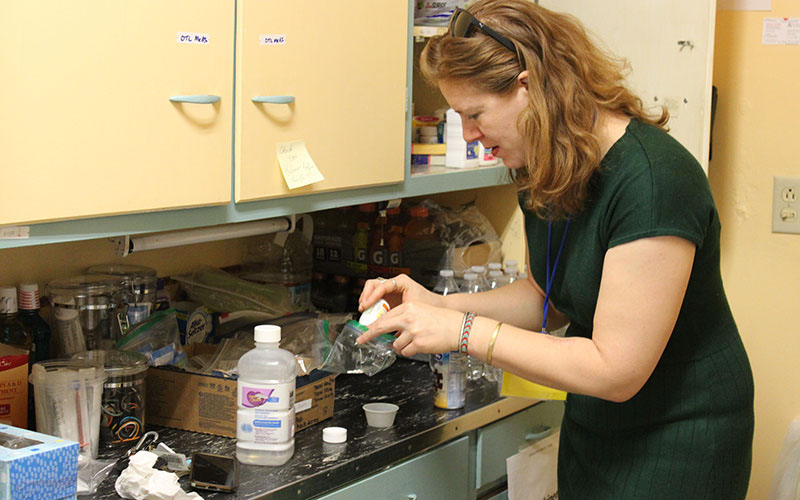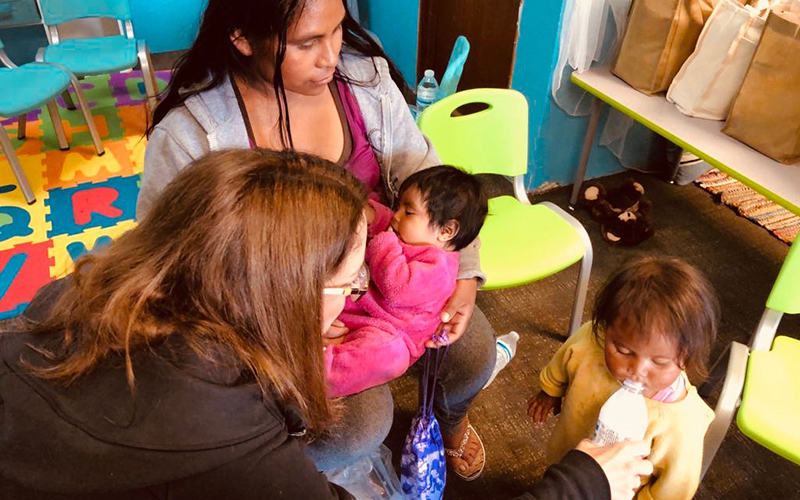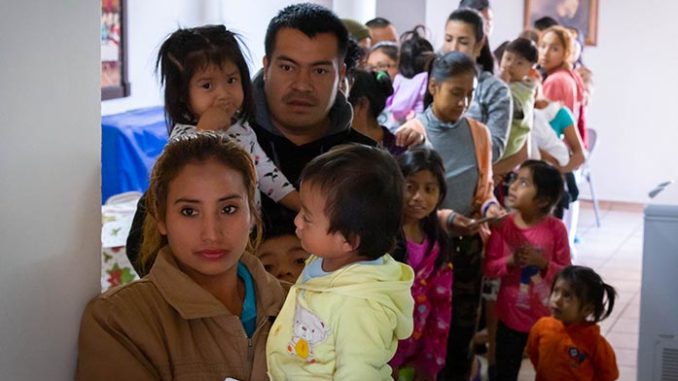
By Miranda Cyr
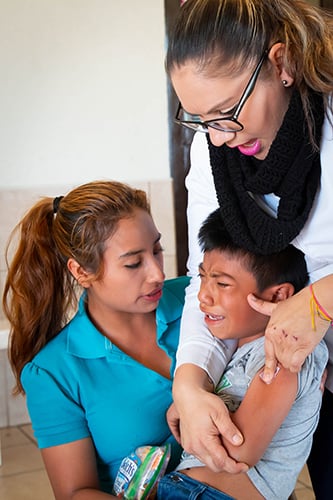
SAN LUIS RÍO COLORADO, Mexico – Inside Casa del Migrante, the piercing screams of an 8-year-old boy echo from a room. Other children, curious and uncertain, look on as Jordan Ramírez battles two nurses trying to vaccinate him against influenza, chicken pox and measles.
Jordan’s family arrived here 15 days earlier from their home in the Mexican state of Chiapas, intent on seeking asylum in the United States. Despite her son’s obvious terror, Maribel López was grateful for the care for him and his two siblings.
She and her husband couldn’t afford health care for their kids in Chiapas.
“We don’t have enough money to give our children well-being and a better life,” she said.
Her children were among 120 people receiving free vaccinations late last month at Casa del Migrante, a shelter across the border from Arizona that temporarily houses immigrants waiting to head to the U.S.
American doctors, members of Congress and immigrant advocates have been pushing U.S. Customs and Border Protection officials to vaccinate migrants to prevent illness and death. Their calls come after several migrant children, including some diagnosed with the flu, have died while in U.S. custody.
With CBP so far rejecting those requests, some organizations are working to get migrants the health care they need – on the Mexican side of the border.
One Hundred Angels, a Phoenix organization that provides medical care and other services to migrants, helped coordinate the one-day vaccination clinic at Casa del Migrante, working with the Mexican Red Cross.
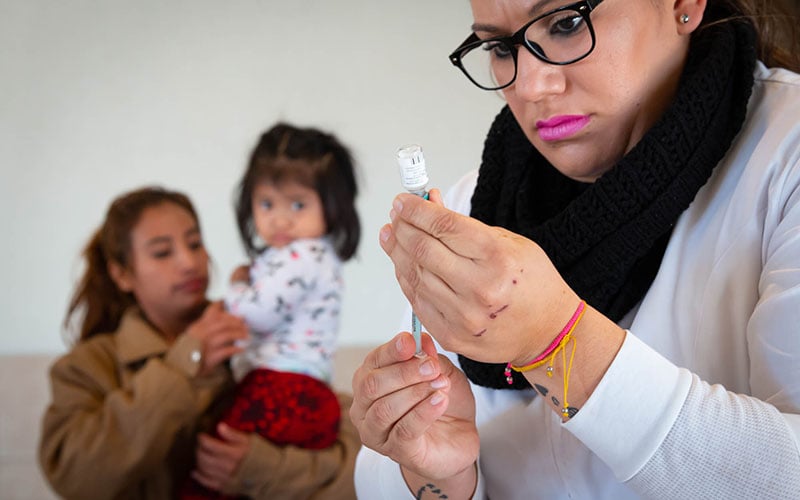
Andrea Ramírez, 2, of Chiapas, Mexico, watches in anticipation as Daniela Gastelum prepares a vaccine. The one-day clinic was sponsored by One Hundred Angels with support of the Mexican Red Cross. (Photo by Delia Johnson/Cronkite News)
One Hundred Angels founder Cecilia Garcia made the seven-hour roundtrip drive with two volunteers, a nurse and a doctor in a van packed with snacks and supplies to donate. After she saw that efforts to vaccinate migrants in U.S. facilities were being blocked, she decided to go a different route.
“We went around; we went to the other side of the border,” she said. “Once they’re in detention, and they really can’t protect themselves, they are so vulnerable.”
Since September 2018, at least seven migrant children have died while in U.S. custody or shortly after their release. They ranged in age from 19 months to 16 years.
At least three died in part to the flu, according to medical investigations and a letter from 13 U.S. senators to the Department of Homeland Security, which oversees Customs and Border Protection.
Felipe Gomez Alonzo, 8, was one of the victims.
The Guatemalan boy was in CBP custody in New Mexico when he was taken to a hospital Dec. 24, 2018, complaining of a sore throat and other symptoms. According to a report by New Mexico’s medical investigator, he was prescribed ibuprofen and released back to agents.
That same night, after his father asked that Felipe be taken to the hospital again, the boy complained of abdominal pain, vomited blood and became unresponsive. He died of complications from influenza B.
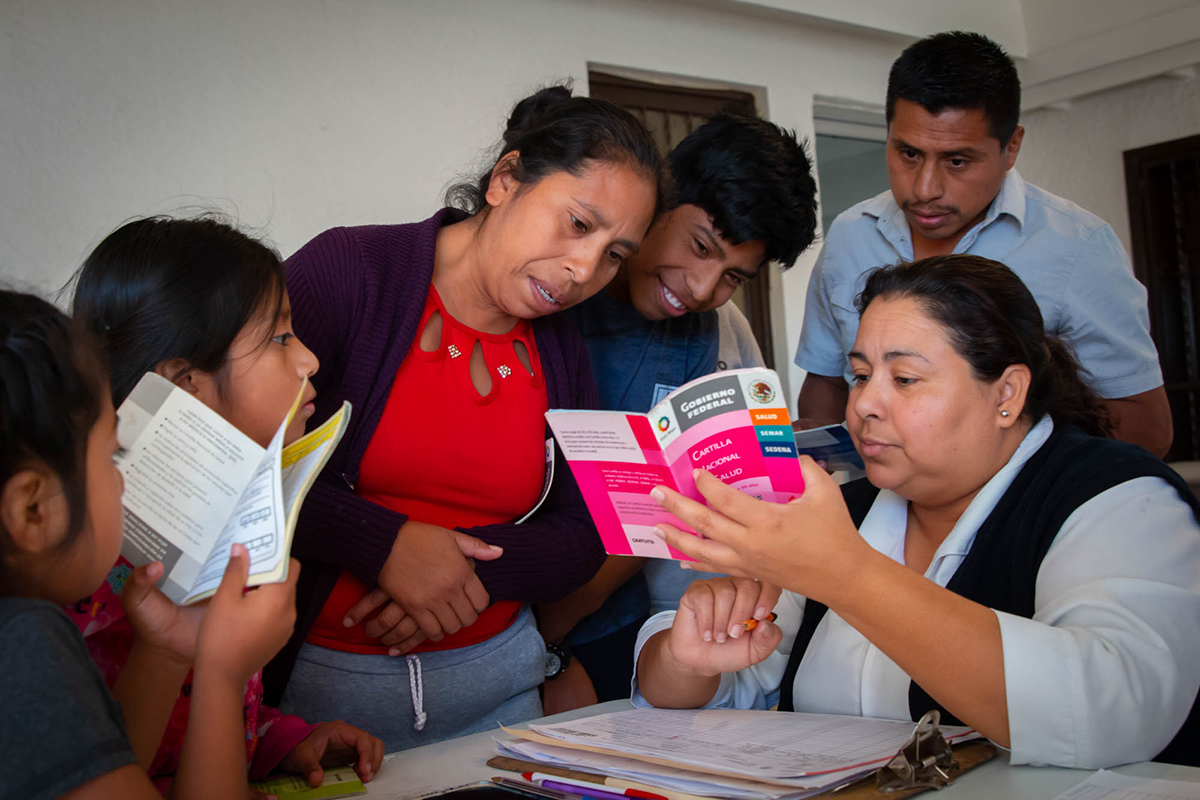
A migrant family looks at their health card, or Cartilla Nacional de Salud. This Mexican government document allows families to keep track of what vaccines they’ve received and determine what shots they still need. (Photo by Delia Johnson/Cronkite News)
Shortly after Felipe’s death, teams of experts from the Centers for Disease Control and Prevention visited border facilities in Yuma and El Paso, Texas, and the agency provided written recommendations about how best to control flu and other viruses in CBP facilities. Those included a recommendation that flu vaccinations be given “at the earliest feasible point of entry” to anyone 6 months or older.
Nevertheless, CBP officials have declined to provide vaccinations to migrants in their facilities. In an emailed statement, the agency said that administering vaccines is not a CBP practice.
The agency notes its facilities are meant to hold migrants for up to three days before transfer to longer-term housing under Immigration and Customs Enforcement or, in the case of unaccompanied minors, U.S. Health and Human Services – agencies that are able to provide vaccinations and other medical care.
Despite that 72-hour window, government reports and lawsuits reveal that migrants have been kept in CBP holding facilities for as long as a month, increasing the potential for disease to spread.
Video by Tina Giuliano/Cronkite News
On Feb. 19, a federal judge in Tucson determined that CBP facilities in southeastern Arizona violate the Constitution because the conditions are “presumptively punitive.” In fiscal year 2019, 12,030 individuals were kept longer than the 72-hour limit in that border sector.
Noting that the migrants held in those facilities are civil detainees and not convicted criminals, Judge David Bury said conditions “are substantially worse than conditions afforded criminal detainees at the Santa Cruz County jail or other jail facilities, where detainees are medically screened by medical professionals; have a bed with cloth sheets, blankets, and pillows … have clean clothing … showers, toothbrushes and toothpaste, and warm meals.”
His ruling, which comes in a class-action lawsuit brought by detainees, prohibits CBP from holding processed detainees longer than 48 hours, unless the agency “provides conditions of confinement that meet basic human needs.”
In testimony last month before a House subcommittee on border operations, Brian Hastings, chief of law enforcement operations for CBP, said the agency has expanded its medical support program, adding hundreds of contracted medical professionals who work 24/7.
“DHS and CBP remain committed to ensuring that individuals in CBP custody receive appropriate care, including medical support,” he said.
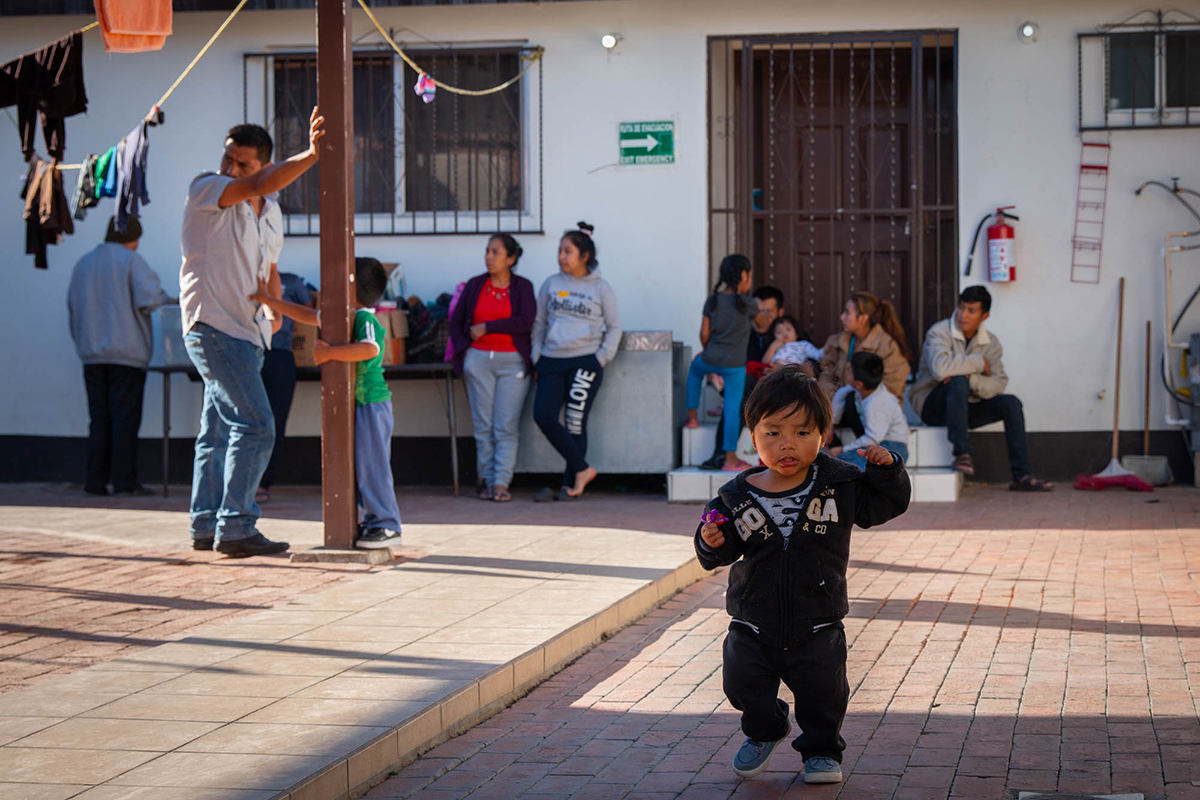
Migrant families wait at Casa del Migrante before they receive shots and medical care. (Photo by Delia Johnson/Cronkite News)
In the U.S., several organizations are advocating for better health care for those in custody.
Doctors for Camp Closure, a group of health care professionals who oppose detention of immigrants, has tried – unsuccessfully – to offer free vaccinations for detainees.
The group’s co-founder, Dr. Marie DeLuca, said her organization sent a letter to DHS in December but got no response. Group members then waited outside the Chula Vista Border Patrol Station in California for two days in hope that their licensed medical providers would be able to vaccinate those inside.
However, they were denied access, and six of their members were arrested for peaceful protest, including DeLuca and three other doctors.
“We’ve heard that Border Patrol feels that as a law enforcement agency, it isn’t their … responsibility to provide things like vaccinations,” DeLuca said. “But the reality is that they’re creating these problems by placing people in detention.
“We know that if we don’t advocate for those changes, people will die. But ultimately, what we’re really advocating for is a system for people seeking asylum and for people coming into the United States that respects human rights and dignity.”
The number of those seeking entry into the United States has increased substantially in past years, and more families are being apprehended. In fiscal year 2017, 310,531 immigrants were apprehended by CBP, and 216,370 immigrants who were seeking lawful admission into the U.S. were deemed inadmissible. In fiscal year 2019, those numbers rose to 859,501 and 288,523, respectively.
The rise has led to overcrowded conditions in facilities on both sides of the border, and greater health care challenges.
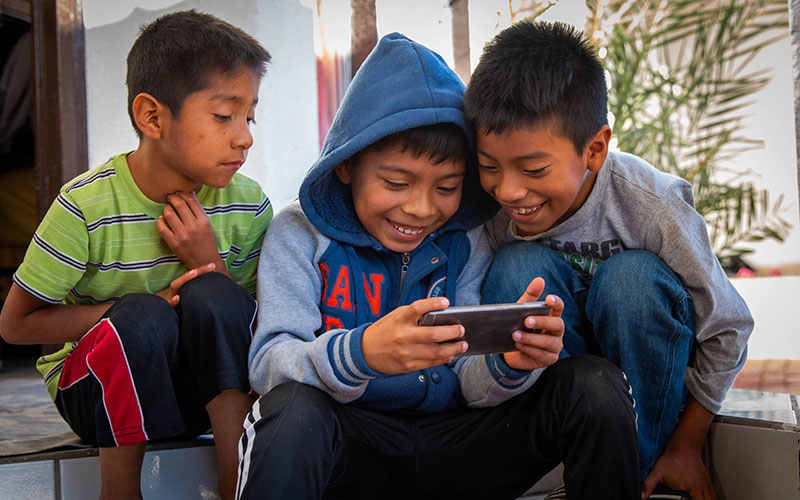
Children play games on a phone before receiving vaccinations in the courtyard of Casa del Migrante. (Photo by Delia Johnson/Cronkite News)
Martín Salgado, founder of Casa del Migrante, said traffic through his shelter in San Luis Río Colorado has increased fivefold amid changes to U.S. immigration policy under President Donald Trump. In January 2019, for example, the administration implemented the so-called “remain in Mexico” policy, sending asylum-seekers back to Mexico while they await processing.
Casa del Migrante started in 1992, when a recently deported immigrant had the idea to open a dining hall for hungry migrants. Salgado and his mother helped make that dream a reality.
Where it once only offered breakfast, the shelter can now house up to 85 people at a time, and migrants stay from three to 14 days. One closet-size room holds four sets of bunk beds. More dormitories filled with bunk beds line the back wall of a courtyard that serves as the main social area. There, toys are scattered on concrete and lines of laundry dry in the sun.
“It grew little by little,” Salgado said.
On a recent weekday, the One Hundred Angels team and the Mexican Red Cross worked in the main entry room, setting up folding tables and chairs to perform checkups and administer shots.
Dr. Georgina Aguilar Portillo, who traveled with the Phoenix group, said immigrants like those at the shelter are especially susceptible to illness.
“They’re not eating enough, so they become sick faster, and also they’re all in the same small room,” she said, adding that close contact eases person-to-person transmission of diseases.
López and her husband were vaccinated along with their children. She hopes to find a home in the United States, where she’s been told that it is clean and beautiful. She dreams of her children getting a good education in America, and growing up healthy.
As for the care she received at Casa del Migrante, López said: “I’m so grateful.”
Garcia said One Hundred Angels plans to continue to collaborate with the Mexican Red Cross to provide more vaccines to shelters in the future. The group recently used donations to buy 16 flu shots, which they quickly distributed at a clinic in Mexico.
“We’re finding them before they go to detention, where we know exactly what’s going to happen,” Garcia said. “The least we can do is support them in this aspect. … We’re saving people’s lives.”

